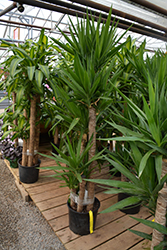Fri & Sat 8am - 8pm
Sun 8am - 7pm
Anytown, USA 12345
fax: 261.787.0463
e-mail: info@successgc.com


Plant Finder

Height: 5 feet
Spread: 4 feet
Sunlight:
![]()
Other Names: Stick Yucca, Giant Yucca, Cane Yucca
Description:
A stunning addition to any indoor area; featuring long green, sword-like leaves and beautiful clusters of nodding white bell flowers in the spring and summer; a low maintenance selection that prefers bright indirect sunlight
Features & Attributes
Spineless Yucca features bold panicles of white bell-shaped flowers rising above the foliage from late spring to late summer. Its attractive sword-like leaves remain green in color throughout the year.
This is a multi-stemmed evergreen houseplant with a more or less rounded form. Its relatively coarse texture stands it apart from other indoor plants with finer foliage. This plant may benefit from an occasional pruning to look its best.
Planting & Growing
When grown indoors, Spineless Yucca can be expected to grow to be about 4 feet tall at maturity, with a spread of 4 feet. It grows at a slow rate, and under ideal conditions can be expected to live for approximately 20 years. This houseplant requires direct sun for optimal performance, and should therefore be situated in a room that gets bright sunlight for a good part of the day; it is not a good choice for rooms lit only by artificial light. It prefers dry to average moisture levels with very well-drained soil, and may die if left in standing water for any length of time. This plant should be watered when the surface of the soil gets dry, and will need watering approximately once each week. Be aware that your particular watering schedule may vary depending on its location in the room, the pot size, plant size and other conditions; if in doubt, ask one of our experts in the store for advice. It is not particular as to soil pH, but grows best in sandy soil. Contact the store for specific recommendations on pre-mixed potting soil for this plant.
There are many factors that will affect the ultimate height, spread and overall performance of a plant when grown indoors; among them, the size of the pot it's growing in, the amount of light it receives, watering frequency, the pruning regimen and repotting schedule. Use the information described here as a guideline only; individual performance can and will vary. Please contact the store to speak with one of our experts if you are interested in further details concerning recommendations on pot size, watering, pruning, repotting, etc.
-- THIS IS A HOUSEPLANT AND IS NOT MEANT TO SURVIVE THE WINTER OUTDOORS IN OUR CLIMATE --
